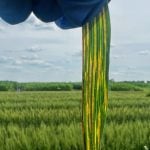A new formulation of the Envita bacterium distributed by Syngenta is expected to help farmers tap into more of the nitrogen crops need throughout the season — without adding more fertilizer.


Envita Dry ‘gives plants ability to source additional nitrogen from atmosphere’

With symptoms that mimic tan spot and rust, BLS often goes unnoticed

But with more companies entering the biologicals and biostimulant space, Prairie growers are being urged to look past the hype and dig into the data

Eppich News: It was a great calving season, despite a reminder why quick veterinary help is indispensable

Scientists consider how we could better support relationships between plants, soil and microbes


Spores forced up by changes in soil moisture


One day, farmers may be able to use natural products to fight blackleg and other diseases